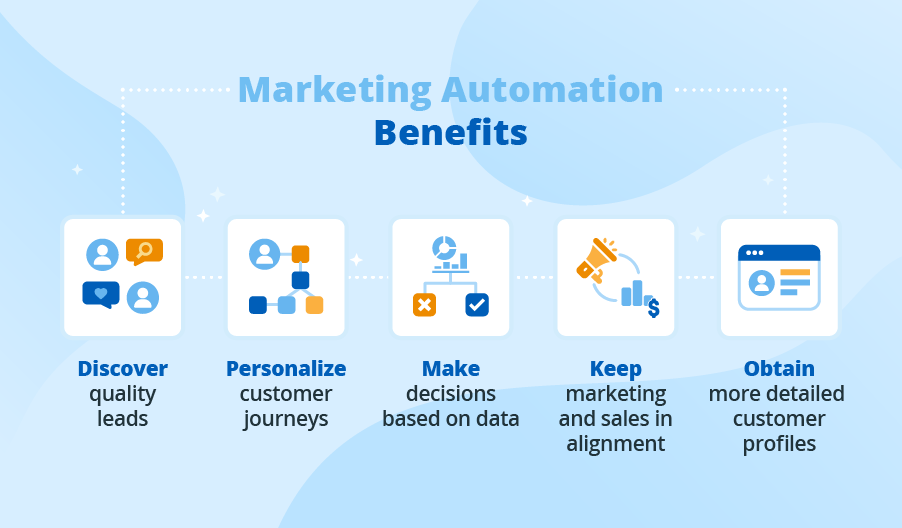In the fast-paced world of digital marketing, staying ahead of the curve is not just a benefit; it’s a necessity. This is where marketing automation comes into play, a powerful tool that has transformed the marketing landscape. Marketing automation refers to software platforms and technologies designed for marketing departments and organizations to more effectively market on multiple channels online (such as email, social media, websites, etc.) and automate repetitive tasks.
The objective of this blog post is to provide an in-depth understanding of marketing automation tools. We’ll explore what these tools are, how they have evolved, and the multitude of ways they can benefit your business. Whether you’re a small startup or a large corporation, understanding and utilizing marketing automation tools can be a game-changer in your marketing strategy.
Table of Contents
Understanding Marketing Automation

What is Marketing Automation?
In simple terms, marketing automation is the use of software to automate marketing activities. It helps marketers streamline their lead generation, segmentation, lead nurturing, lead scoring, customer lifecycle marketing, cross-sell and up-sell, customer retention, and marketing ROI measurement.
Evolution of Marketing Automation
The concept of marketing automation has been around since the 1990s, evolving from simple email marketing tools to sophisticated platforms that can manage and automate almost all aspects of marketing. The early 2000s saw the rise of cloud-based solutions, offering more agility and integration with various marketing channels. Today, marketing automation is an integral part of customer relationship management (CRM) systems, blending marketing and sales processes to drive higher efficiency.
Primary Functions of Marketing Automation Tools
Marketing automation tools are designed to perform several key functions:
- Streamlining Marketing Processes: By automating repetitive tasks like email sends, social media postings, and ad campaigns, these tools save time and increase efficiency.
- Enhancing Customer Experience: They provide personalized customer experiences by tailoring content and interactions based on user behavior and preferences.
- Improving Lead Management: Automation tools help in tracking and nurturing leads from initial contact until they are sales-ready, improving the lead management process.
- Measuring Marketing Performance: They offer analytics and reporting features that help in measuring and optimizing the performance of marketing campaigns.
Key Features of Marketing Automation Tools
Marketing automation tools come packed with a range of features designed to enhance and streamline your marketing efforts. Here are some of the key features to look for in a marketing automation tool:
- Email Marketing: Central to most marketing strategies, email marketing automation allows for the sending of targeted messages to different segments of your audience. For example, an e-commerce site can automate birthday emails with special offers to its customers.
- Lead Nurturing and Scoring: These features enable you to automatically send content that is relevant to the lead’s stage in the buying process, and score leads based on their engagement. A lead showing more engagement can be flagged as a hot lead and given priority.
- Social Media Management: This allows for the scheduling and publishing of posts across various social media platforms, as well as monitoring social interactions and engagements. For instance, a brand can schedule a series of posts about a new product launch across different social media platforms.
- Analytics and Reporting: This feature provides insights into the performance of your marketing campaigns, helping you understand what’s working and what isn’t. You can track metrics like email open rates, click-through rates, and conversion rates.
- CRM Integration: Integrating marketing automation tools with CRM systems ensures alignment between sales and marketing, provides a unified view of the customer, and helps in tracking the customer journey from prospect to customer. For example, a prospect’s interaction with marketing emails can be recorded in the CRM, providing valuable insights to the sales team.
Benefits of Using Marketing Automation Tools

Implementing marketing automation tools in your business strategy can bring numerous benefits:
- Streamlined Marketing Efforts: By automating repetitive tasks, marketing teams can focus on more strategic and creative work.
- Increased Efficiency: Automation helps in managing and executing multiple campaigns simultaneously, increasing overall marketing efficiency.
- Improved Lead Generation: With targeted content and personalized experiences, marketing automation tools can significantly enhance lead generation efforts.
- Enhanced Customer Engagement: By providing relevant content at the right time, these tools help in nurturing and maintaining customer engagement.
- Better Sales Conversion: With improved lead nurturing and scoring, sales teams receive better qualified leads, leading to higher conversion rates.
Choosing the Right Marketing Automation Tool
Selecting the appropriate marketing automation tool for your business can be a pivotal decision. Here’s some guidance to help you make an informed choice:
- Assess Your Business Needs: Consider the size of your business, the complexity of your marketing campaigns, and specific goals. A small business might need a simple tool, while a large enterprise might require a more robust solution.
- Evaluate Features: Ensure the tool has the features you need. For instance, if email marketing is a priority, look for advanced email automation capabilities.
- Consider User-Friendliness: The tool should be easy to use and require minimal training for your team.
- Integration Capabilities: Check if the tool can integrate seamlessly with your existing CRM, analytics, and other software.
- Budget: Determine your budget and find a tool that offers the best value within your price range.
Top Marketing Automation Tools in the Market
To give you a head start, here’s a comparison of some popular marketing automation tools:
| Tool Name | Key Features | Ideal Business Size | Pricing |
|---|---|---|---|
| HubSpot | All-in-one marketing, Sales CRM integration | Small to Large | Tiered Pricing |
| Marketo | Lead management, Email marketing | Medium to Large | Custom Pricing |
| Mailchimp | Email automation, Easy-to-use templates | Small to Medium | Free-Tier Available |
| Pardot by Salesforce | Advanced CRM integration, Lead scoring | Medium to Large | Custom Pricing |
| ActiveCampaign | Email marketing, Sales automation | Small to Large | Tiered Pricing |
Each of these tools has its unique strengths and can cater to different business needs and sizes.
Best Practices for Implementing Marketing Automation
To maximize the benefits of marketing automation, consider these best practices:
- Start with Clear Goals: Define what you want to achieve with marketing automation.
- Keep Data Clean and Organized: Regularly update and maintain your database for effective targeting.
- Segment Your Audience: Tailor your messages to different audience segments for better engagement.
- Test and Optimize: Continuously test different strategies and use analytics to optimize your campaigns.
- Train Your Team: Ensure your team is well-trained to use the marketing automation tool effectively.
Conclusion
Marketing automation tools are indispensable in the modern digital marketing landscape. They not only streamline operations and increase efficiency but also provide valuable insights into customer behavior and campaign performance. By choosing the right tool and implementing best practices, businesses can significantly enhance their marketing efforts, leading to improved customer engagement and higher sales conversions.
As you consider integrating marketing automation tools into your strategy, remember that the goal is to create more personalized, engaging, and effective marketing campaigns that resonate with your audience and drive results.
Check out the rest of the ‘Updated Ideas‘ site; there are some cool articles waiting for you! Fancy writing for us? Just give that contact button in the top right a tap. Cheers!

